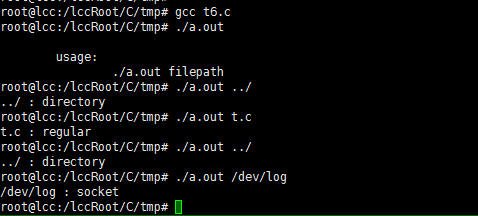linux下的C开发13,stat函数与文件类型
发表于: 2019-01-06 13:56:57 | 已被阅读: 1018 | 分类于: Linux笔记
前面几节讨论了在 linux 中进行 C语言开发时,执行 I/O 的基本函数。不过在举例做实验的过程中,都是围绕普通文件进行的。

linux 中的文件类型
还记得在第9节,我们提到 unix 系统(linux是类unix系统)认为“一切皆文件”吗?unix 系统中大多数文件是普通文件和目录,这两种类型的文件也是最常使用的,比如 /usr 目录和它里面的 hello.txt 文本文件就属于普通文件类型。
事实上,linux 系统将所有文件分为以下几大类:
- 普通文件。
- 目录文件。
- 块特殊文件。这种类型的文件以磁盘为典型代表,linux 内核一般提供带缓冲的读写,以磁盘为例,每次读写一般都是固定长度的数据(一个扇区的数据),而且内核往往不是立刻将数据写到磁盘,而是在之后cpu较为空闲时写入。
- 字符特殊文件。以终端为例,处理这种文件时,内核不需要提供缓冲读写,例如程序输出字符到串口,通常希望越快响应越好。
- FIFO。这种类型的文件一般用于多进程间通信。
- 套接字。这种类型的文件用于进程间的网络通信。
- 符号链接。这种类型的文件类似于 windows 中的快捷方式。
获取 linux 中的文件类型
linux 提供了 stat 系列函数获取文件的统计信息。在 linux 中输入 man stat,即可得到 stat 函数的使用手册:
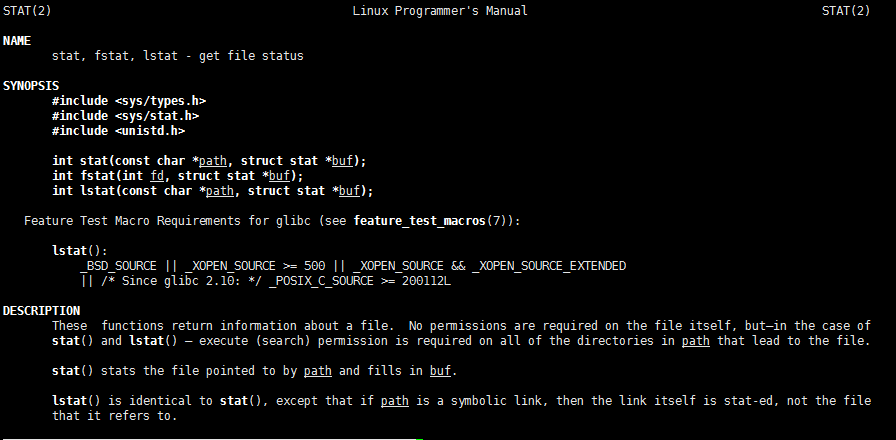
- struct stat {
unsigned long st_dev;
unsigned long st_ino;
unsigned short st_mode;
unsigned short st_nlink;
unsigned short st_uid;
unsigned short st_gid;
unsigned long st_rdev;
unsigned long st_size;
unsigned long st_blksize;
unsigned long st_blocks;
unsigned long st_atime;
unsigned long st_atime_nsec;
unsigned long st_mtime;
unsigned long st_mtime_nsec;
unsigned long st_ctime;
unsigned long st_ctime_nsec;
unsigned long __unused4;
unsigned long __unused5;
};
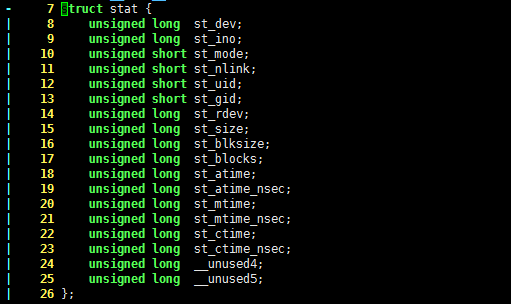
...
#define S_ISDIR(mode) __S_ISTYPE((mode), __S_IFDIR)
#define S_ISCHR(mode) __S_ISTYPE((mode), __S_IFCHR)
#define S_ISBLK(mode) __S_ISTYPE((mode), __S_IFBLK)
#define S_ISREG(mode) __S_ISTYPE((mode), __S_IFREG)
#ifdef __S_IFIFO
# define S_ISFIFO(mode) __S_ISTYPE((mode), __S_IFIFO)
#endif
#ifdef __S_IFLNK
# define S_ISLNK(mode) __S_ISTYPE((mode), __S_IFLNK)
#endif
...
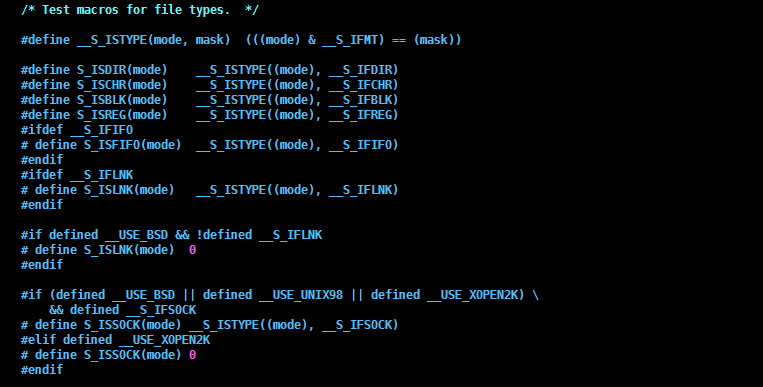
C语言实例,获取 linux 文件类型
知道了 stat 函数和以上几个宏,编写 C语言程序获取文件的类型是方便的:
#include <stdio.h>
#include <sys/types.h>
#include <sys/stat.h>
#include <unistd.h>
int main(int argc, char* argv[])
{
if(argc < 2){
printf("\n\tusage:");
printf("\n\t\t%s filepath\n", argv[0]);
return -1;
}
struct stat tmp;
char* res;
lstat(argv[1], &tmp);
if(S_ISREG(tmp.st_mode))
res = "regular";
else if(S_ISDIR(tmp.st_mode))
res = "directory";
else if(S_ISBLK(tmp.st_mode))
res = "block";
else if(S_ISLNK(tmp.st_mode))
res = "link";
else if(S_ISFIFO(tmp.st_mode))
res = "fifo";
else if(S_ISSOCK(tmp.st_mode))
res = "socket";
else
res = "unknown";
printf("%s : %s\n", argv[1], res);
return 0;
}
以上代码使用了 lstat 函数,而不是 stat 函数,它俩的功能是相同的。唯一不同之处在于处理符号链接时,lstat 是将该符号链接直接作为文件处理的,而 stat 函数则是处理该符号链接指向的文件。
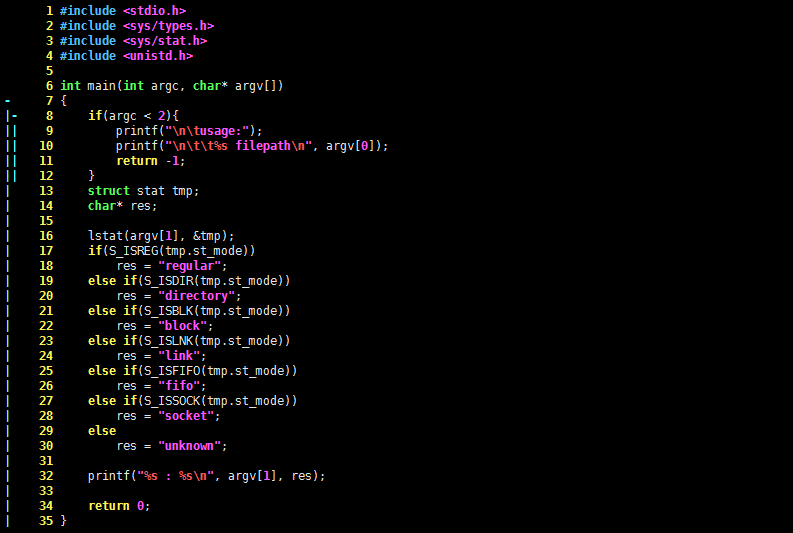
# gcc t6.c
# ./a.out
usage:
./a.out filepath
# ./a.out ../
../ : directory
# ./a.out t.c
t.c : regular
root@lcc:/lccRoot/C/tmp# ./a.out ../
../ : directory
# ./a.out /dev/log
/dev/log : socket
#
